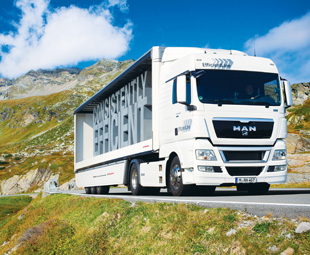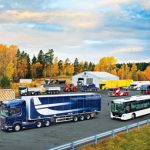A silver lining?

The transport industry can breathe a little easier as the proposed carbon tax has been postponed by one year … But is this only a delay of the state lining its coffers with more silver, or will the environmental benefit be a real silver lining to this additional charge? JACO DE KLERK investigates
During his budget speech to Parliament, Finance Minister Pravin Gordhan said that South Africa will delay the introduction of a carbon tax by one year (which would have started on January 1, 2015) to allow for further consultation on its implementation.
Robbie Louw, a director of Promethium Carbon, a carbon advisory firm, adds: “The delay follows issues and concerns that were raised during public consultation, and input from the Department of Environmental Affairs, that the carbon tax should be part of a larger group of measures.”
He continues: “Apart from the carbon tax, environmental regulations, renewable energy projects and other targeted support programmes are required to address climate change and reduce emissions.”
And this is exactly what government aims to do, rather optimistically, as The Carbon Report (another carbon consultancy firm, which is a division of sustainableIT – a company specialising in CO2 reduction, through the application of smart technology), notes on its blog.
Recognising the importance of reducing carbon emissions five years ago, and foreseeing the benefits that a low-carbon economy can bring, the South African government voluntarily committed to ambitious greenhouse gas reductions of 34 percent by 2020 and 42 percent by 2025.
But is this commitment leading to government strong-arming the country and all its industries, towards another cost to fill its coffers? Louise Naudé, national climate change officer at World Wildlife Fund (WWF) South Africa, begs to differ …
“Treasury does not necessarily want more income into the coffers, as it’s willing to think about other kinds of reductions to offset the tax,” she points out. “The tax is really a lever to try and drive business operations away from emission-intensive activities and products, towards lower-carbon options.”
But, of course, the “greenies” will support a carbon tax as they only care about the environment and not much else? Well, not exactly … “We did make an input to Treasury on the carbon tax, as there are some elements that need refinement,” Naudé explains, “it also has to be supported by other measures – a carbon tax alone will probably not be effective enough.”
Louw adds that the measures must however, be aligned. “The National Development Plan also mentioned the importance of creating a framework for the transition to an environmentally sustainable, low-carbon economy.”
He continues: “Specifically, the alignment of the proposed tax with the system of Desired Emission Reduction Outcomes (DEROs), requires more time. The Department of Environmental Affairs is designing the DERO system as an implementation tool for the carbon budgets, which form a central part of the government’s overall climate change response strategy.”
Louw points out that the extension, offered by the minister in the budget speech, gives companies the opportunity to actively engage with National Treasury on the design of the tax. But what features does the carbon tax include thus far?
First up, according to The Carbon Report, the tax will be phased in to allow for a smooth transition in adopting cleaner and more efficient technologies and behaviours.
(Already transport companies are doing what they can to curb costs and CO2 emissions with some operators only able to go “greener” once the “same shade” of vehicles are available. However, this will only be viable once fuel with lower parts per million sulphur content is readily available – legislated for introduction in
July 2017 …)
The first five-year phase will run from January 1, 2016, which will be followed by a second five-year phase. The Carbon Report states that thereafter an entirely new tax system will be introduced.
Tax has been proposed at R120 per tonne of carbon dioxide equivalent (CO2e), which will be increased by 10 percent per year. However, as Teresa Legg – a director at The Carbon Report – points out, the rate will affectively be much lower than R120 per tonne of CO2e during the first phase – thanks to some thresholds.
“The tax will initially be R48 per tonne CO2e,” she explains. Why R48? Well, to allow businesses to adapt and transition to low-carbon alternatives, a 60 percent tax-free threshold of actual emissions will apply for the first five years, below which tax isn’t payable. So, in actual fact, you will only have to pay 40 percent of the tax.
The Carbon Report states that the thresholds will be reviewed after the first phase, and are expected to be reduced until the end of the second phase. It notes that the tax-free threshold may be adjusted to favour organisations that perform well, in relation to sector benchmarks of emission intensity.
The organisation adds that offsets can be used to reduce tax. However, limits will apply to the percentage of emissions that can be offset. “So it is as much a reward, in terms of avoiding tax if you’re doing the right thing, as it is a punishment for the emissions,” Naudé emphasises.
She continues: “It is really a business opportunity, because the more you migrate to less carbon-intensive options, the more you have a competitive advantage. You will be taxed less, so your profit will be better.”
However, there is an uncertainty over the emission sources that will be taxed … The Carbon Report adds that, for prudence, one should assume that the tax will cover all
Scope 1 emissions in the tax base. These include all those that result from sources that are owned or controlled by the organisation and are typically from combustion, gasification and from non-energy industrial processes.
So there are many inconsistent and ambiguous points in the proposed policy, which will, hopefully, be ironed out in future papers. But it would seem that government has heard industry’s call with the postponement of the tax – providing more time for things to be sorted out.
However, only time will tell if this additional tax will be another means for the state to line its coffers, or if it will be a silver lining for the environment – with the funds going to where they are sorely needed.
Published by
Focus on Transport
focusmagsa




